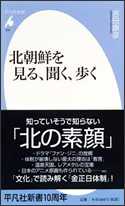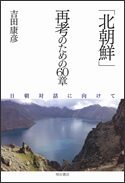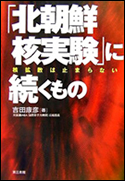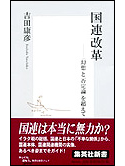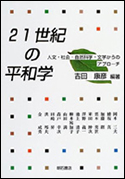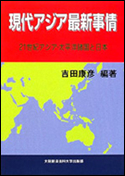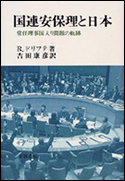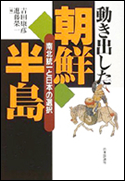Japan as the 51st State of America
There is a popular anecdote saying, “Once America sneezes, Japan catches cold, and once Washington catches cold, Tokyo develops pneumonia.” Some Japanese in somewhat self-deprecation classify their country as the 51st State of America because of its heavy dependence on America in not only defense and security, but politics, economy, science and culture. “Even the State of California might be more independent of Washington D.C, than Japan,” they deplore masochistically.
During the initial years of Japan’s entry into the United Nations in the 1960s and early 70s, the Japanese delegation voted “yes” or “no,” looking at its American colleagues and taking the same attitude as they did. Foreign correspondents used to remark, “Japan is indeed an American satellite, more than those in the Soviet bloc.” At that time, all the East European countries belonging to the Warsaw Pact were called the satellites of Moscow.
While I was stationed in Geneva as journalist, I myself observed an illustrative scene. During the disarmament negotiations in 1970s, the Soviet ambassador glumly sneaked out of the conference room while his rival American envoy was denouncing the Kremlin for its “imperialist” policy. All his East European colleagues, such as those from Bulgaria, Hungary and Poland stood up one after another to follow their Soviet boss, who just went to toilet. The East Europeans also rushed to toilet, and all came back together. Fortunately, I did not see a Japanese diplomat chasing after his American big brother walking out of the conference room.
Post-War Americanization of Japan as a success story
In almost all human activities, I don’t deny Japan has been placed under strong American influence since the end of World War Two. Japan’s ruling Liberal-Democratic Party, since the renowned diplomat-turned Prime Minister YOSHIDA Shigeru, has been proud of having made the country a mini-America. It was in 2007 that Prime Minister ABE Shinzo, a grand son of KISHI Nobusuke who also cemented Japan’s ties to Washington, declared that since his country and the U.S. fully shared common values, such as freedom, democracy, respect for human rights and market mechanism, he would pursue common value-oriented diplomacy world-wide. As a matter of fact, it is the Americans who implanted and infused such values into the minds of Japanese of the post-war generations.
The whole of the Japanese nation was easily democratized and “Americanized” by the General Headquarters(GHQ) of the Allied Forces headed by General Douglas MacArthur, who occupied this country for seven years from 1945, after defeating the imperialist and militarist Japan. Democratization of Japan in the American way is often described as a success story of American occupation. Fifty-eight years afterward, Washington’s neo-conservatives attempted to democratize Saddam Hussein’s Iraq in the same way when President Bush’s soldiers invaded into Baghdad, but failed. Thousands of American soldiers were killed amid Iraqis’ hatred and resentment as unwelcome invaders, thus turning the whole nation into the stage of turmoil with massacres, tortures and rapes, as well as suicide bomb attacks in retaliation. Outgoing President George Bush, during a press conference on his last visit to Baghdad in December 2007, became the target of a pair of shoes hurled by an Iraqi journalist as a gesture of insult. The scene was telecast world-wide and made the Iraqi a national hero.
On the other hand, almost all Japanese, narrowly survived on the war?torn land of hunger, climaxed with the atom bombings of Hiroshima and Nagasaki in August 1945, enthusiastically hailed MacArthur as if their own hero and accepted his military occupation as a turning point in history ushering in their economic recovery and rehabilitation. Japan docilely and obediently introduced almost all political, economic and social systems from America. The American 6-3-3 school system was introduced as a core of educational reform with the philosophy of equality and equity in social status and gender.
Colorful Hollywood movies---comedies, Westerns, musicals, home dramas and love romances--- overwhelmed the Japanese film market, enchanting tens of millions of Japanese, young and old. Dixieland jazz fascinated young Japanese music fans. Baseball has become one of the most popular spectacular sports in Japan, now with more than 10 Japanese professionals playing in the MBL and games staged in America relayed live on Japanese TV almost every day during the season.
Life style of the post-war Japanese people has thus been Americanized so much that you come across with MacDonald hamburger and Kentucky fried chicken and other fast-food shops and restaurants, as well as American-originated convenience stores everywhere throughout the country. Coca cola is now a national drink. All these phenomena are likewise called “cocacolanization” which Japanese accommodated without hesitation.
The exception---the only difference from the U.S. in political system--- is perhaps the continued reign of the Emperor, whom, to avoid confusion, MacArthur agreed to stay in the throne as a powerless symbol of the Japanese nation. Japan thus retained its 2,600-year-old Imperial monarchy, though nominally, and in fact revived the British-style parliamentary system with the prime minister as head of the government, unlike South Korea and the Philippines, which, in the American way, are headed by the president.
The strongest bond in the Japan-U.S relationship is in national defense and security. Under the war-renouncing post-war Constitution, the demilitarized Japan is deprived of an army, navy and air force. What Japan has been allowed to possess instead is the Self-Defense Forces only limited to defend its own territory. Japan hence concluded a bilateral security treaty, under which more than 35,000 American soldiers are stationed to thwart possible outside aggression on Japan. In addition, Japan is protected by American nuclear deterrence. It is called a nuclear umbrella stretched by the U.S. which instead prevents Japan from going nuclear by herself.
Departure from dependence on Washington possible?
In this article, the editor asked me to discuss whether Japan should slough off its dependence on America, at a time when the Obama Administration is inaugurated in Washington on 20 January. My answer is, “Yes, it should, but “cannot.”
The primary reason for my negative answer is Tokyo’s total reliance on Washington in defense and security, which, as already explained, is the basis of a nation’s independence and sovereignty. Since 1945, Japan has entrusted the U.S. with counter-measures against any military threats from outside. Okinawa, a main island of the Ryukyu in the south, serves as the largest overseas American military base, thus becoming an indispensable outpost in deploying the Pentagon’s world strategy. This would remain unchanged even under the Obama Administration. President-elect Barak Obama’s slogan was “change” but it would not apply to this case.
At home in Japan, national public opinion polls show that some two-thirds of the Japanese people constantly support or at least acquiesce in the Japan-U.S. security treaty under which they are tied in a military alliance. It is against this background that the Japanese Government has agreed, for the past 20 years, to shoulder a substantial portion of maintenance costs of the U.S. Forces stationed in Japan, which amounts to more than two-billion dollars a year. The Japanese Government made such a generous decision in the late 1980s, when U.S. economy was suffering from snow-bowling deficits. “Yankee-go-home” demonstrations flare up in Okinawa and elsewhere, whenever American soldiers commit crimes, for instance, rapes on Japanese girls, but do happen only occasionally nowadays.
The second reason for my pessimism is that Japan still relies heavily on the U.S. in trade and industry, especially in high-tech fields. Although Japan’s number-one trade partner is now China with total both-way amount at more than 20-billion dollars, America still retains the exclusively important status in supplying Japan with strategic goods, such as fighter-bombers and other military equipment for the Self-Defense Forces, as well as jumbo jets. The Mitsubishi Heavy Industries and some other Japanese makers have exclusive contracts on joint production of parts and components.
Peaceful uses of nuclear energy are another field of U.S. monopoly. In Japan, 55 nuclear power plants produce some one-thirds of Japan’s electricity needs with a total output of more than 50-million kilowatts a year. Light-water reactors, now under capital control of the Toshiba and Hitachi, are originally inventions of the General Electrics and the Westinghouse. The Japanese makers pay some one-billion dollars in patent fee every year to the two major American industrial firms. Uranium enrichment for reactor fuel for use in Japan is almost entirely an exclusive American business. The two countries are thus interacted closely---too closely to get divorced.
The third reason is information and intelligence. By means of most advanced information technology, such as observation satellites, and highly trained intelligence agents, including the CIA and DIA, Washington is a center of all information gatherings and analyses on international affairs. Japanese diplomats and defense officials confess there is no other way than to count on American sources before making their own policy decisions. For example, initial reports on North Korea’s missile and nuclear tests in 2006, as well as the brain stroke which hit Pyongyang’s dictator Kim Jong-il in 2008, all originated from American intelligence sources. How can Tokyo free itself of its reliance upon Washington under such circumstances?
All in all, it would be extremely difficult for Tokyo to get rid of Washington in a foreseeable future, and Washington would never relinquish its grip on Japan. If it happens, this would undoubtedly be a great loss and shock for the Americans. Now, let me make a number of suggestions at least to avoid Japan’s excessive dependence on the U.S.
Where there is the will, there is a way
As already stated, the question is not whether Japan should slough off Washington, but how it could do. Even if the two countries share common values, their national and geopolitical interests are quite different, since Japan, an insular country scarce of natural resources, is located, rather isolated, in the Far East. It still suffers from bitter residues of aggressor and invader upon the rest of East Asia during the first half of the 20th century.
Japan, in this sense, does need to improve relations with the neighboring countries, especially China--- a rising great power in Asia in terms of population and economy, as well as regional political influence. The Obama Administration is reportedly prepared to placing a greater emphasis on its ties to Beijing from their strategic viewpoints. This already happened during the former Clinton Administration, which did “Japan passing,” after “Japan bashing.”
To counter such an expected move, I would suggest Japan should step up its efforts to form an East Asian economic community, with the European Union (EU) as a successful model. The 27-member EU has a stronger voice in the international community than as a single nation in Europe, located between the U.S. and Russia. There has been a positive trend toward the planned formation. Since 1997, Japan, China and South Korea in addition to the 10-member Association of Southeast Asian Nations (ASEAN), have been holding annual summit meetings in that direction. An East Asian summit, further comprising India, Australia and New Zealand, has also taken place since 2006. The Japanese Government, however, seems less enthusiastic, presumably considerate of Washington’s concern about an exclusive, potentially anti-American grouping. Future hinges upon how much Japan lays emphasis on China.
The second suggestion is the strengthening of the United Nations. Japan’s bid for permanent membership in the Security Council should be strengthened to materialize by 2010, the 65th anniversary of its foundation. There is a general consensus to see Japan, which shares 16% of the UN budget as the second largest contributor, qualified as a new permanent member, but no agreement has been reached as to which other nations, such as Germany and India, and how many altogether should be accepted as new members. These are part of a package deal on enlargement of the Security Council in the dragging-on UN reform discussions. Here again, China’s support is indispensable, as Beijing, having veto in the Security Council, opposed Japan’s bid in 2005 at the time of the 60th anniversary.
Once being a permanent member, it would be a duty for Japan to express its own views, make consensus-building efforts by submitting specific proposals to cope with any issues threatening international peace and security. Japan’s own endeavors to gather and analyze information are subsequently required. Greater responsibility for implementing adopted resolutions also falls on the permanent members. A new horizon for Japan’s free-hand diplomacy would thus emerge.
The third and last suggestion is greater efforts for denuclearization. Nuclear non-proliferation is a common concern for the U.S. and the other nuclear-weapon states, which have been lukewarm in their own nuclear disarmament. Japan, the sole victim of holocaust in Hiroshima and Nagasaki, is indeed in a position to spearhead an international drive for total abolition of nuclear weapons. Japan, every year for the past 14 years in the UN General Assembly, has submitted a draft resolution on ultimate abolition of all nuclear arms, and had it adopted.
This is not enough. All UN General Assembly resolutions have no legal bindings, but only moral pressure. Furthermore, Japan’s position is criticized by many countries for being covered by the American nuclear umbrella. In this respect, a planned denuclearization of the Korean Peninsula would be a realistic step toward Japan’s future departure from the American nuclear umbrella in East Asia, thus paving the way for Sayonara of Japan to Washington.
Japan, in protest against the unsettled abduction issue, refuses to extend any energy and economic assistance to North Korea, which the five members of the six-party talks in Beijing had agreed to offer in exchange for North Korea’s gradual denuclearization process. Japan’s interest is limited only to the abduction case, in which a group of Japanese citizens were kidnapped from Japan by North Korean intelligence agents, mostly more than 30 years ago. North Korea’s leader Kim Jong-Il announced that eight of the 15 abductees had been dead, and apologized to Japan’s Prime Minister KOIZUMI during their summit in Pyongyang in September 2002. Japan, rejecting the announcement, claims that all the abductees be freed and returned safe and sound to Japan. Japan’s refusal to accept a package deal thus hampers denuclearization of the Korean Peninsula, Japan and the whole of Northeast Asia.
France as a model for a freer Japan
What would then be advantages of Japan being more independent and less reliant upon America, with a freer hand in foreign, national security and economic policies? My answer is simple; the international community, especially its Asian neighbors, would regard this country with greater trust and respect. This, in turn, could upgrade Japan’s status and influence in joining in global efforts for world peace, nuclear disarmament, eradication of poverty and environmental protection.
A model is France, which, as a core nation of the EU, is esteemed widely by the peoples of the world for its highly independent foreign policy, while being a traditional ally to and an equal partner of America. French President Nicolas Sarkozy has made a shuttle diplomacy to mediate in conflicts between Russia and pro-American Georgia in Caucasus, and most recently took the initiative to urge U.S. President George Bush to call an urgent 25-nation summit in Washington to cope with a global financial crisis.
France, during General Charles de Gaulle’s era in the 1960s, was the first in the West to diplomatically recognize the People’s Republic of China in Beijing and once withdrew from military obligations of the North Atlantic Treaty Organization (NATO) to maintain a free hand in diplomacy. It should also be noted that the French people are proud of their unique cultural identify; French language, fine arts and architecture, as well as food culture and fashion, which are all popular and familiarized world-wide. France has even successfully launched culture diplomacy with these attractions, making Paris a center of the world. Since Japan’s traditional culture, such as Kabuki and Ukiyoe, and healthy food, such as Sashimi and Sushi, are admired with equally global favor, these assets could well be an effective tool for Japan’s culture diplomacy, as for the French.
John Dower, a Pulitzer prize-awarded American historian and professor, writes the Japanese have lived in post-war days embracing defeat and thus inferiority complex vis-?-vis the Americans; emancipation from this obsession would certainly make us Japanese more self-confident and satisfied in our daily life, and more positive and self-assertive in the international community.
【"JAPAN CLOSE-UP" February 2009】


